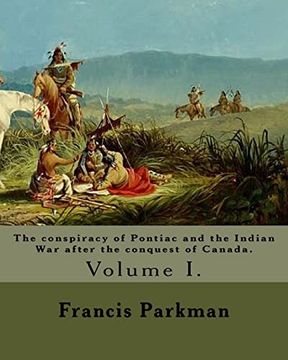The conspiracy of Pontiac and the Indian War after the conquest of Canada. By: Francis Parkman, dedicated By: Jared Sparks. (Volume I). In two volume' (en Inglés)
Reseña del libro "The conspiracy of Pontiac and the Indian War after the conquest of Canada. By: Francis Parkman, dedicated By: Jared Sparks. (Volume I). In two volume' (en Inglés)"
Jared Sparks (May 10, 1789 - March 14, 1866) was an American historian, educator, and Unitarian minister. He served as President of Harvard College (now Harvard University) from 1849 to 1853.... Francis Parkman Jr. (September 16, 1823 - November 8, 1893) was an American historian, best known as author of The Oregon Trail: Sketches of Prairie and Rocky-Mountain Life and his monumental seven-volume France and England in North America. These works are still valued as historical sources and as literature. He was also a leading horticulturist, briefly a professor of Horticulture at Harvard University and author of several books on the topic. Parkman was a trustee of the Boston Athen um from 1858 until his death in 1893. Early life: Parkman was born in Boston, Massachusetts to the Reverend Francis Parkman Sr. (1788-1853), a member of a distinguished Boston family, and Caroline (Hall) Parkman. The senior Parkman was minister of the Unitarian New North Church in Boston from 1813 to 1849. As a young boy, "Frank" Parkman was found to be of poor health, and was sent to live with his maternal grandfather, who owned a 3,000-acre (12 km ) tract of wilderness in nearby Medford, Massachusetts, in the hopes that a more rustic lifestyle would make him more sturdy. In the four years he stayed there, Parkman developed his love of the forests, which would animate his historical research. Indeed, he would later summarize his books as "the history of the American forest." He learned how to sleep and hunt, and could survive in the wilderness like a true pioneer. He later even learned to ride bareback, a skill that would come in handy when he found himself living with the Sioux. Education and career: Parkman enrolled at Harvard College at age 16. In his second year he conceived the plan that would become his life's work. In 1843, at the age of 20, he traveled to Europe for eight months in the fashion of the Grand Tour. Parkman made expeditions through the Alps and the Apennine mountains, climbed Vesuvius, and lived for a time in Rome, where he befriended Passionist monks who tried, unsuccessfully, to convert him to Catholicism. Upon graduation in 1844, he was persuaded to get a law degree, his father hoping such study would rid Parkman of his desire to write his history of the forests. It did no such thing, and after finishing law school Parkman proceeded to fulfill his great plan. His family was somewhat appalled at Parkman's choice of life work, since at the time writing histories of the American wilderness was considered ungentlemanly. Serious historians would study ancient history, or after the fashion of the time, the Spanish Empire. Parkman's works became so well-received that by the end of his lifetime histories of early America had become the fashion. Theodore Roosevelt dedicated his four-volume history of the frontier, The Winning of the West (1889-1896), to Parkman. In 1846, Parkman travelled west on a hunting expedition, where he spent a number of weeks living with the Sioux tribe, at a time when they were struggling with some of the effects of contact with Europeans, such as epidemic disease and alcoholism. This experience led Parkman to write about American Indians with a much different tone from earlier, more sympathetic portrayals represented by the "noble savage" stereotype. Writing in the era of manifest destiny, Parkman believed that the conquest and displacement of American Indians represented progress, a triumph of "civilization" over "savagery", a common view at the time. He was elected a fellow of the American Academy of Arts and Sciences in 1855, and in 1865 was elected a member of the American Antiquarian Society......

